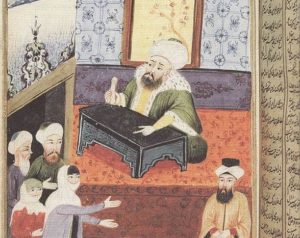
 Heterodoxy Among Muslim Judges: On Attempts at Jokes and Judicial Constraints Incoming Senior Fellow at ILSP: SHARIAsource, Maribel Fierro, examines a scene of heterodoxy in therecently published English translation of The Ultimate Ambition. Translated from Arabic into English for the first time in full by Elias Muhanna of Brown University, The Ultimate Ambition was written in the 14th century by a retired Egyptian bureaucrat named Shihab al-Din al-Nuwayri. Fierro looks at a scene in which the judge Yaḥyā ibn Aktham is asked to explain the meaning of desire. When he gives a humorous answer, the theologian Thumāma expresses displeasure. Fierro portrays the theologian’s reproach as an expression of his anxiety about the prevailing attitude of being “relaxed” about codified practice and decorum. But, Fierro observes, the judge’s attitude was not unique to his time. She discusses ways in which exchanges like that one continue to this day. Read more. Image credit: Public Domain
Heterodoxy Among Muslim Judges: On Attempts at Jokes and Judicial Constraints Incoming Senior Fellow at ILSP: SHARIAsource, Maribel Fierro, examines a scene of heterodoxy in therecently published English translation of The Ultimate Ambition. Translated from Arabic into English for the first time in full by Elias Muhanna of Brown University, The Ultimate Ambition was written in the 14th century by a retired Egyptian bureaucrat named Shihab al-Din al-Nuwayri. Fierro looks at a scene in which the judge Yaḥyā ibn Aktham is asked to explain the meaning of desire. When he gives a humorous answer, the theologian Thumāma expresses displeasure. Fierro portrays the theologian’s reproach as an expression of his anxiety about the prevailing attitude of being “relaxed” about codified practice and decorum. But, Fierro observes, the judge’s attitude was not unique to his time. She discusses ways in which exchanges like that one continue to this day. Read more. Image credit: Public Domain
 Book Profile: The Ultimate Ambition in the Arts of Erudition The Ultimate Ambition in the Arts of Erudition by Shihab al-Din al-Nuwayri, edited and translated from Arabic by Elias Muhanna, Manning Assistant Professor of Comparative Literature, Brown University, (New York: Penguin, 2016).
Book Profile: The Ultimate Ambition in the Arts of Erudition The Ultimate Ambition in the Arts of Erudition by Shihab al-Din al-Nuwayri, edited and translated from Arabic by Elias Muhanna, Manning Assistant Professor of Comparative Literature, Brown University, (New York: Penguin, 2016).
 In Summary: SHARIAsource Workshop Talk with Osama Siddique The Other Pakistan: Special Laws, Diminished Citizenship, and the Gathering Storm Osama Siddique, the Henry J. Steiner Visiting Professor in Human Rights at Harvard Law School, led a discussion on Friday, September 30th at the International and Comparative Law Workshop on the link between failures in legal institutions and the rise of the Taliban in the Swat region in Pakistan. The discussion was based on research Siddique conducted in the region. Instead of focusing on prescriptive models for solutions, the discussion examined problematic tensions between the region’s various interests. Among the conflicting parties were the mainstream Pakistani courts and the traditions of dispute resolution within FATA (Federally Administered Tribal Areas) and PATA (Provincially Administered Tribal Areas), two distinct legal entities in Pakistan. Led by Professor Intisar Rabb and Professor William Alford, the workshop pulled at threads of history, sociology, and economics. Through the discussion, participants drew parallels between other regions’ challenges and considered how different types of research methods can produce more applied findings. Image Credit: SHARIAsource
In Summary: SHARIAsource Workshop Talk with Osama Siddique The Other Pakistan: Special Laws, Diminished Citizenship, and the Gathering Storm Osama Siddique, the Henry J. Steiner Visiting Professor in Human Rights at Harvard Law School, led a discussion on Friday, September 30th at the International and Comparative Law Workshop on the link between failures in legal institutions and the rise of the Taliban in the Swat region in Pakistan. The discussion was based on research Siddique conducted in the region. Instead of focusing on prescriptive models for solutions, the discussion examined problematic tensions between the region’s various interests. Among the conflicting parties were the mainstream Pakistani courts and the traditions of dispute resolution within FATA (Federally Administered Tribal Areas) and PATA (Provincially Administered Tribal Areas), two distinct legal entities in Pakistan. Led by Professor Intisar Rabb and Professor William Alford, the workshop pulled at threads of history, sociology, and economics. Through the discussion, participants drew parallels between other regions’ challenges and considered how different types of research methods can produce more applied findings. Image Credit: SHARIAsource
See the full newsletter.

